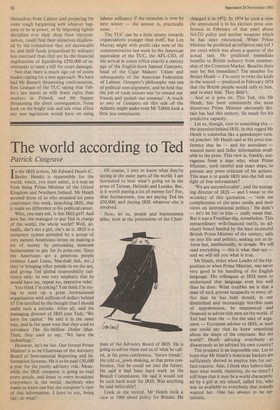The world according to Ted
Patrick Cosgrave
T n the IRIS system, Mr Edward Heath (C. 'Bexley Heath) is responsible for the world; which, you must admit, is a step up from being Prime Minister of the United Kingdom and Northern Ireland. Mr Heath assured those of us who attended his press conference this week, launching IRIS, that it made no difference to his political career.
Who, you may ask, is this IRIS girl? And how has she managed to put Ted in charge of the world, the whole world? Well, actually, she's not a girl, she's an it. IRIS is a computer system attended by a group of very earnest Americans intent on making a lot of money by persuading innocent businessmen to pay for its print-out. Since the Americans are a generous people (witness Land Lease, Marshall Aid, etc.,) they're bringing other people in on the act, and giving Ted global responsibility (advisory only: he was very emphatic that he would have no, repeat no, executive role).
You think I'm joking? You think I'm trying to send up a great international organisation with millions of dollars behind it? I'm terrified by the thought that I should make such a mistake. After all, said the managing director of IRIS (not Ted), 'We have the capital.' He said it in the same way, and in the same tone that they used to introduce The Six-Million Dollar Man. Then, they used to say, 'We have the technology.'
However, let's be fair. Our former Prime Minister is to be Chairman of the Advisory Board of International Reporting and Information Systems. He is to be paid £50,000 a year for his purely advisory role. Meanwhile the IRIS computer is going to read every article, and listen to every broadcast everywhere in the world. Anybody who wants to know can buy the computer's view of this information. I have to say, being fair, so what? Of course, I love to know what they're saying in the outer parts of the world. I am fascinated to hear what's going on in the press of Taiwan, Helsinki and Lusaka. But, is it worth paying a lot of money for? For, dear businessmen, you are paying Ted his £.50,000; and paying IRIS whatever else is involved.
Now, let us, people and businessmen alike, look at the pretensions of the Chair man of the Advisory Board of IRIS. He is going to advise them and us of what he called, at his press conference, 'future trends'. He told us, jowls shaking, at that press conference, that he could see into the future. He said it had been hard work on the Brandt Commission. He said it would not be such hard work for IRIS. Was anything he said believable?
Look at the record. Mr Heath took a view in 1969 about policy for Britain. He changed it in 1972. In 1974 he took a view (he announced it in his election press conference in February of that year) about NATO policy and nuclear weapons which he has since renounced. When Prime Minister he predicted an inflation rate (of 5 per cent) which was about a quarter of the actual rate. He predicted immediate benefits to British industry from membership of the Common Market. Benefits there may be; but immediate? The member for Bexley Heath — I'm sorry to twist the knife in the wound — predicted in February 1974 that the British people would rally to him, and re-elect him. They didn't.
And so it goes on. This Ted, this Mr Heath, has been consistently the most disastrous Prime Minister electorally Britain has had this century. So much for his predictive capacity.
Let us, though, turn to something else — the intention behind IRIS. In this regard Mr Heath is somewhat like a gamekeeper turned poacher. Mr Heath said at his press conference that he — and his associates — wanted more and fuller information available to the press. This view is, frankly, outrageous from a man who, when Prime Minister, took careful and exact steps, to prevent any press criticism of his actions. This man is to guide IRIS into the full sunlight of free information?
'We are uncomfortable', said the managing director of IRIS — and I swear to the accuracy of this quotation — 'with the completeness of the news media and their views on international politics.' He didn't — let's be fair to him — really mean that. But it was a Freudian slip, nonetheless. This extraordinary well-financed outfit, its advisory board headed by the least successful British Prime Minister of the century, sails on into life and politics, seeking not to inform but, intellectually, to invade. We will read everything — this is what they say — and we will tell you what is true.
Mr Heath, either when Leader of the Opposition or when Prime Minister, was never very good in his handling of the English language. His colleagues at IRIS seem to understand that language even less well than he does. What troubles me is that a man of such proven incapacity in every office that he has held should, in our diminished and increasingly horrible state of apprehension, be empowered and financed to advise rich men on the world. If Ted had been the — for the sake of argument — European adviser to IRIS, at least one could say that he knew something about the shape of the continent. But the world? Heath advising everybody as disastrously as he advised his own country?
The prospect is an impossible one. Let us hope that Mr Heath's American backers are sufficiently shrewd to employ him for surface reasons. Alas, I think they believe him. Into what world, therefore, do we enter? I still hope that it may be a world characterised by a girl at my school, called Iris, who was so available to everybody that nobody wanted her. One has always to be optimistic.














































 Previous page
Previous page